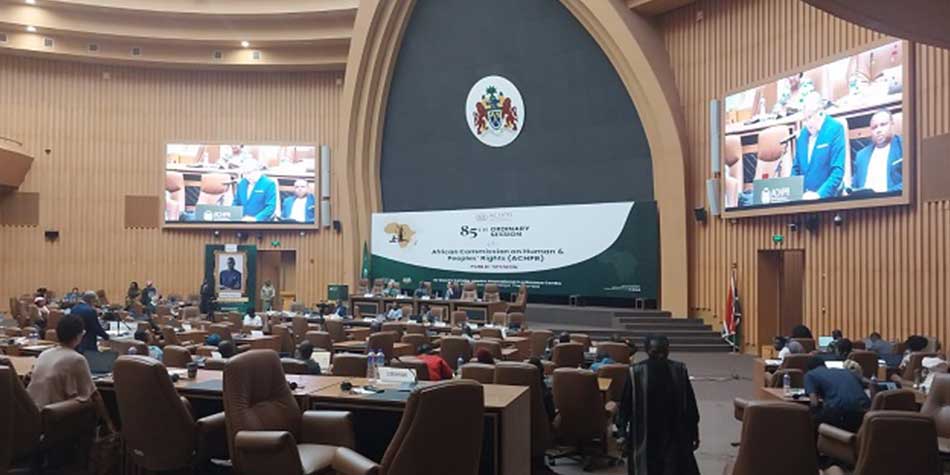
Judicial Influence on Death Penalty Abolition: Global Legal Perspectives at the Biennial High-Level Panel
Advocacy
On February 25, 2025, the biennial high-level panel on the death penalty was held at the United Nations Human Rights Council in Geneva, under the theme “Contribution of the Judiciary to the Advancement of Human Rights and the Question of the Death Penalty.”
How the judiciary may contribute to the abolition of the death penalty
The discussion brought together panelists from various legal and governmental backgrounds to offer their insights into how the judiciary could further contribute to the abolition of the death penalty.
Ms. Virginia Mabiza, Attorney-General of Zimbabwe, provided the historical context to her country’s recent decision to abolish the death penalty, emphasizing that this shift was not just legal but deeply societal. She traced the evolution of justice in Zimbabwe, noting how pre-colonial era restorative justice systems were followed by colonial-era punitive systems, which then gave way to a post-colonial approach focused on reconciliation and human rights. This was also highlighted by Equatorial Guinea in its Oral statement emphasizing how the abolition of the death penalty is not simply a symbolic act but a profound transformation in the administration of justice.
Mr. Ramkarpal Singh, Member of Parliament and former Deputy Minister in the Prime Minister’s Department of Malaysia, revealed how a decade of deliberations and studies ultimately led to the abolition of mandatory death penalties for certain offenses in 2023. He argued that executing people involved in drug trafficking at a low level, often poor individuals coerced into trafficking, does little to combat the real issues, emphasizing the importance of rehabilitation instead.
Mr. Hicham El Mellati, Director of Criminal Affairs, Pardons and Crime Detection at the Ministry of Justice of Morocco, presented an equally nuanced position, highlighting the pivotal role of judicial discretion in his country’s de facto moratorium on the death penalty and calling for a balanced debate on the death penalty and its deterrent value. This last point resonates with the call of Spain to retentionist countries to consider a moratorium, as opposed to abolition.
Mr. Dannel P. Malloy, former Governor of Connecticut (U.S.A) and Commissioner of the International Commission against the Death Penalty, pointed out that U.S. states with active death penalty laws tend to have higher crime rates, undermining the argument that executions deter crime and emphasized the judicial responsibility to prevent irreversible errors as “mistakes happen too often”.
High Commissioner for Human Rights Volker Türk echoed many of these sentiments, emphasizing the chilling societal effects of the death penalty. He pointed out that while a growing majority of countries are abolishing it, those who continue to apply it, especially for non-lethal crimes like drug offenses, undermine international human rights standards.
Reactions from Civil Society Organizations
Various members of the World Coalition Against the Death Penalty took the floor following these interventions, such as Ensemble Contre la Peine de Mort (ECPM), which stressed that the death penalty “targets above all the most marginalized and vulnerable categories of the population”, as well as minorities and people suffering from psychosocial or intellectual disabilities.
Women are a critical example of this, as recalled by The Advocates for Human Rights (TAHR). Indeed, their speech was an opportunity to emphasize the crucial role that the judiciary plays in combating gender discrimination by recognizing mitigating circumstances such as domestic violence. Recent decisions by American courts, such as the one handed down by the Supreme Court in the case of Andrew v. White, show the importance of taking gender bias into account when sentencing women.
Reprieve has also emphasized the importance of the role of judges in Kenya, where challenges persist despite undeniable progress such as the Karioko Muruatetu ruling handed down in 2017 by the Supreme Court declaring the mandatory death penalty unconstitutional. However, the Supreme Court issued guidelines in 2021 intended to streamline resentencing processes, but which contradict the intention of the Muruatetu ruling and have inadvertently created a disparity by limiting the declaration of unconstitutionality to murder sentences only. As of February 16, 2025, 177 individuals, including three women, still face death sentences.. In addition, insufficient consideration of gender-based violence remains a major problem. This echoed with Malaysia’s statement underlining how the role of the judiciary was enhanced by the retrospective application of the Abolition of Mandatory Death Penalty Act 2023, as it allowed courts the option to impose an alternative sentence upon any person on whom a death sentence had been passed before the law came into force.
In this context, the invitation to the 9th World Congress against the Death Penalty to be held in Paris early July 2026, launched by ECPM to the Member States of the United Nations, is most welcome.






